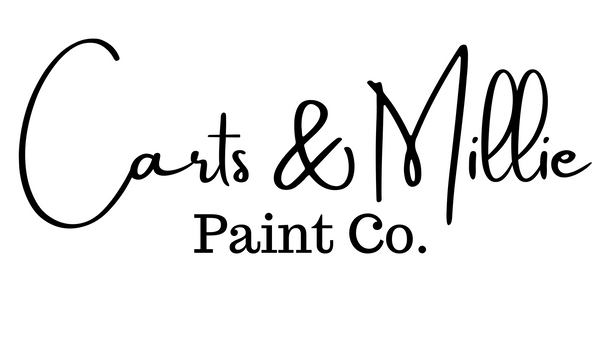For anyone who hasn’t used the IOD Decor Stamps, they are essentially what they sound like. A stamp. Similar to a stamp that you might’ve used as a child - but magical. The IOD Decor Stamps have the power to transform an item that you found on the side of the road to an item that you will have to convince your husband you didn’t spend your entire monthly budget on. Yeah, that good.
PREPARATION IS KEY
Before removing from backing, condition your stamps with very fine sandpaper, scuff the surface in two directions. This helps the mediums stay put, and not bead (which some types, like ceramics glazes, tend to do).
Remove stamps from backing when ready to use. This takes some force, but don’t worry, the stamps are strong.
DIFFERENT MOUNTS FOR DIFFERENT SURFACES
Freestyle stamping. This is what we call it when you use a flexible piece of plastic, such as the clear sheet that came with the stamps, as a mounting device. Simply position the stamp on the sheet and proceed. This is great for irregular surfaces such as walls or furniture (surprisingly, many furniture surfaces that appear flat have dips - this method will conform nicely).
No mount. This is when you would use the stamp without mounting to anything, because you want it to really conform to a curved surface, or even stretch. For example, I stamped the front of my cowboy boots, and was able to stretch the stamp and conform it cleanly to the surface even though the boot is very curved. When using the bare stamp make sure that your fingers don’t stick to it, this could cause the stamp to lift from the surface and create a smudge. Nobody likes an unintentional smudge.
Whichever mounting method you use, the stamp backs must be perfectly clean, as well as the mount, in order for the stamp to cling firmly to the mount.
DIFFERENT MEDIUMS
Paint: Paint works wonderfully with the Decor Stamps. When using paint we recommend creating a small puddle to roll a small dense foam roller in. Make sure you get an even load and roll onto the design side of the mounted (or if using unmounted, proceed accordingly) stamp. This part takes a little practice to get the feel of the load so that it’s enough to give you the impression you want without being sloppy. Also keep in mind variables such as the surface you are stamping, the medium you are using, as well as the look you are trying to achieve. Practice makes perfect!
Ink: Our Decor ink, and most other inks, work fabulously with the Decor Stamps as well. Ink gives finer detail and tends to be a little more translucent than paint, keep this in mind in consideration to your project. We find that we like using paint and ink equally, and they lend themselves well to different projects and surfaces. We recommend using the blank stamp pads to apply the ink (one for each colour), then pat the surface of the stamp with it.
SURFACES AND APPLICATIONS
Fabric: When stamping fabric the load of medium should be generous in order to penetrate the fibres, and the look will be different with different levels of fabric texture. Decor ink, Chalk paint and other fabric suitable mediums work well. It is our opinion that the ideal fabric for permanent washables is 100 percent cotton. However, blends and some other natural fibres can sometimes work as well. Do a small test to be sure. Allow your newly stamped fabric to dry/cure for a minimum of 24 hours, then heat set with an iron on high heat before washing.
Furniture: Both painted and stained furniture can be stamped. In fact, this is one of the most common uses of our Decor Stamps. You can use ink or paint, but I tend to use paint more for furniture.
Walls: Walls are a fabulous surface opportunity for Decor Stamps. Create all over patterns that are a level up from wallpaper, and completely custom, or use the decor stamps to create an old world border. We love using paint for wall applications!
CARING FOR YOUR STAMPS
We find that the easiest way to care for and clean stamps is to keep wet wipes nearby, and avoid letting the medium dry all the way on the stamp surface. Then, when you have time, wash them with mild soap and warm water. For some mediums you may find that you need a stamp cleaner. Use one that is safe for clear stamps. After thoroughly cleaned, place them back on the clear backing for storage.
Continue reading more in this series:
- How to use stencils
- How to do raised stencils
- How to use transfers
- How to use stamps (you're here!)
- How to use moulds
- How to dry brush

